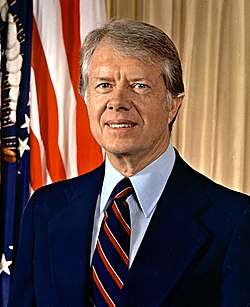Jimmy Carter Quote
Ours was the first nation to be founded on the idea that all are created equal and all deserve equal treatment under the law. Despite our missteps and shortcomings, these ideals still inspire hope among the oppressed and give us pride in being Americans.
Jimmy Carter
Ours was the first nation to be founded on the idea that all are created equal and all deserve equal treatment under the law. Despite our missteps and shortcomings, these ideals still inspire hope among the oppressed and give us pride in being Americans.
Related Quotes
Nowadays, a simple faulty brake light traffic stop, can get a black person killed. It's better to fix the broken light bulb, then having to face and cooperate with a senseless police officer.
Anthony Liccione
Tags:
african american, america, black, blacklivesmatter, citizen, come to terms, come together, death, equality, fatal
Unfortunately, the board of directors that the middle managers report to generally make them aggressive. Imagine being hired into a company and then being told that you have to ignore the emerging hea...
Steven Magee
Tags:
activities, aggressive, america, board, company, corporate, dangerous, directors, emerging, engage
There is coming a day, when freedom will just be a essence of the mind, an inner dwelling that was once physically attainable. They will tell you where you can live, and what you can wear and drive, w...
Anthony Liccione
Tags:
abolish, after the rapture, age, america, antichrist, authority, bird, brainwash, buy and sell, cage
About Jimmy Carter
James Earl Carter Jr. (October 1, 1924 – December 29, 2024) was an American politician and humanitarian who was the 39th president of the United States from 1977 to 1981. A member of the Democratic Party, Carter served from 1971 to 1975 as the 76th governor of Georgia and from 1963 to 1967 in the Georgia State Senate. He was the longest-lived president in U.S. history and the first to reach the age of 100.
Born in Plains, Georgia, Carter graduated from the U.S. Naval Academy in 1946 and joined the submarine service before returning to his family's peanut farm. He was active in the civil rights movement, then served as state senator and governor before running for president in 1976. He secured the Democratic nomination as a dark horse little known outside his home state before narrowly defeating Republican incumbent Gerald Ford in the general election.
As president, Carter pardoned all Vietnam draft evaders and negotiated major foreign policy agreements, including the Camp David Accords, the Panama Canal Treaties, and the second round of Strategic Arms Limitation Talks, and he established diplomatic relations with China. He created a national energy policy that included conservation, price control, and new technology. He signed bills that created the Departments of Energy and Education. The later years of his presidency were marked by several foreign policy crises, including the Soviet invasion of Afghanistan (leading to the end of détente and the 1980 Olympics boycott) and the fallout of the Iranian revolution (including the Iran hostage crisis and 1979 oil crisis). Carter sought reelection in 1980, defeating a primary challenge by Senator Ted Kennedy, but lost the election to Republican nominee Ronald Reagan.
Polls of historians and political scientists have ranked Carter's presidency below average. His post-presidency—the longest in U.S. history—is viewed more favorably. After Carter's presidential term ended, he established the Carter Center to promote human rights, earning him the 2002 Nobel Peace Prize. He traveled extensively to conduct peace negotiations, monitor elections, and end neglected tropical diseases, becoming a major contributor to the eradication of dracunculiasis. Carter was a key figure in the nonprofit housing organization Habitat for Humanity. He also wrote political memoirs and other books, commentary on the Israeli–Palestinian conflict, and poetry.
Born in Plains, Georgia, Carter graduated from the U.S. Naval Academy in 1946 and joined the submarine service before returning to his family's peanut farm. He was active in the civil rights movement, then served as state senator and governor before running for president in 1976. He secured the Democratic nomination as a dark horse little known outside his home state before narrowly defeating Republican incumbent Gerald Ford in the general election.
As president, Carter pardoned all Vietnam draft evaders and negotiated major foreign policy agreements, including the Camp David Accords, the Panama Canal Treaties, and the second round of Strategic Arms Limitation Talks, and he established diplomatic relations with China. He created a national energy policy that included conservation, price control, and new technology. He signed bills that created the Departments of Energy and Education. The later years of his presidency were marked by several foreign policy crises, including the Soviet invasion of Afghanistan (leading to the end of détente and the 1980 Olympics boycott) and the fallout of the Iranian revolution (including the Iran hostage crisis and 1979 oil crisis). Carter sought reelection in 1980, defeating a primary challenge by Senator Ted Kennedy, but lost the election to Republican nominee Ronald Reagan.
Polls of historians and political scientists have ranked Carter's presidency below average. His post-presidency—the longest in U.S. history—is viewed more favorably. After Carter's presidential term ended, he established the Carter Center to promote human rights, earning him the 2002 Nobel Peace Prize. He traveled extensively to conduct peace negotiations, monitor elections, and end neglected tropical diseases, becoming a major contributor to the eradication of dracunculiasis. Carter was a key figure in the nonprofit housing organization Habitat for Humanity. He also wrote political memoirs and other books, commentary on the Israeli–Palestinian conflict, and poetry.
